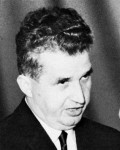 Nicolae Ceausescu (1918-1989) was the communist dictator of Romania for 24 years, from the mid 1960s until his removal in 1989. Under his rule, Romanians endured one of the most oppressive Stalinist regimes of the Cold War. Ceausescu (pronounced ‘chow-chess-koo’) was born into an impoverished peasant family in southern Romania in 1918. He received an elementary education but ran away from his abusive father at age 11. Ceausescu moved to the Romanian capital Bucharest and was apprenticed to a cobbler, who by coincidence was a member of the Romanian Communist Party. The young Ceausescu also became involved in the party, carrying out minor duties. By the late 1930s, Ceausescu was wanted by state authorities. He was eventually arrested and spent most of World War II in prison, where he met future communist leader Gheorghe Gheorghiu-Dej.
Nicolae Ceausescu (1918-1989) was the communist dictator of Romania for 24 years, from the mid 1960s until his removal in 1989. Under his rule, Romanians endured one of the most oppressive Stalinist regimes of the Cold War. Ceausescu (pronounced ‘chow-chess-koo’) was born into an impoverished peasant family in southern Romania in 1918. He received an elementary education but ran away from his abusive father at age 11. Ceausescu moved to the Romanian capital Bucharest and was apprenticed to a cobbler, who by coincidence was a member of the Romanian Communist Party. The young Ceausescu also became involved in the party, carrying out minor duties. By the late 1930s, Ceausescu was wanted by state authorities. He was eventually arrested and spent most of World War II in prison, where he met future communist leader Gheorghe Gheorghiu-Dej.
When the Romanian Workers’ Party seized control of the country in 1947, Ceausescu was given a junior ministry and later a seat in the Politburo. During the 1950s and early 1960s, he held a number of positions under Gheorghiu-Dej. Though never an obvious leadership candidate, Ceausescu was, like Stalin, a skilful manipulator who formed alliances and harvested supporters. In 1965, following Gheorghiu-Dej’s death, Ceausescu was elected general secretary of the Romanian Communist Party and the de facto leader of Romania. In the first few years of his rule, Ceausescu distanced himself from other Soviet bloc leaders by embracing open trade and communication with western Europe. Ceausescu also refused to commit Romanian troops to Warsaw Pact operations, such as the 1968 suppression of the Prague Spring. The Romanian leader’s independent streak and willingness to defy and criticise Moscow increased his popularity in the West. He became one of the socialist bloc’s most well-travelled leaders, visiting several countries including repeat trips to the United States and Britain.
But while Western leaders were hailing his foreign policies, Ceausescu’s authoritarianism and economic adventurism were suffocating his own people. Seeking to transform Romania into a European power, Ceausescu ordered the construction of several oil refineries. This ambitious scheme, funded by foreign loans, cast Romania deep into debt and deprivation. By the mid-1980s Romania was meeting its debt repayments by exporting large amounts of food, while its people endured continued shortages and hunger. Ceausescu also adopted oppressive social policies designed to increase the population and reinforce his own status and authority. Meanwhile, Ceausescu and his wife Elena lived in luxury – while squandering or spiriting away large amounts from the national treasury. Their unpopularity reached fever pitch in the late 1980s, culminating in Ceausescu’s overthrow, mock trial and execution in December 1989.
Content on this page is © Alpha History 2018. This content may not be republished or distributed without permission. For more information please refer to our Terms of Use.
This page was written by Jennifer Llewellyn and Steve Thompson. To reference this page, use the following citation:
J. Llewellyn & S. Thompson, “Nicolae Ceausescu”, Alpha History, accessed [today’s date], https://alphahistory.com/coldwar/nicolae-ceausescu/.
